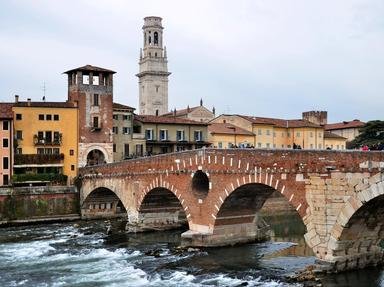12. Who composed the original music to the beautiful lyric "Who is Silvia?", which is sung beneath its dedicatee's window at night, after Valentine's banishment, with Proteus and Thurio in attendance?
From Quiz The Two Gentlemen of Verona
Answer:
we have no idea
The three English composers listed were all small boys around 1590, when the play was written - although some twenty years later Robert Johnson collaborated musically with Shakespeare to great creative effect in "Cymbeline" and "The Tempest". The original music to "Who is Silvia?" has, like that of various other Shakespearean songs, been lost - a victim, no doubt, of the neglect this play seems to have fallen into during Shakespeare's lifetime and afterwards. Franz Schubert famously set a German translation of the words to music in the early 1800s, and the original English words actually fit his setting delightfully. Some might think that the classical Viennese idiom is scarcely suitable for Shakespeare in general, but anyone who listens to what the renowned King's Singers from Cambridge have done with Schubert's version (it is easy to find on youtube) should be able to imagine how this kind of arrangement could go with a zing in many a performance of the play.
The lyrics of "Who is Silvia?" are so lovely that they surely become part of the meaning of this play, and should certainly be regarded as one of the principal highlights of any self-respecting production. They are sung on behalf of the foolish suitor Thurio, but I see them as a kind of eternal justification for the idealistic, youthful romantic longings of Valentine:
"Then to Silvia let us sing
That Silvia is excelling;
She excels each mortal thing
Upon the dull earth dwelling.
To her let us garlands bring."
Artificial, yes, but resonating with romantic idealism. The medieval courtly traditions of chivalry towards high-born women are evidently somewhere behind this feeling, and certain commentators, taking their cue from H.B.Charlton's book "Shakespearian Comedy" (1930), have suggested that Shakespeare is satirising the unreality of such traditions throughout this play, even in the song. Perhaps, but I would prefer to think that - even if, as seems unlikely, the young playwright did set out with purely satirical intentions - there was so much else going on in his head as he was writing the play that much of the force of the satire is lost.



 = Top 5% Rated Quiz,
= Top 5% Rated Quiz,
 Top 10% Rated Quiz,
Top 10% Rated Quiz,
 Top 20% Rated Quiz,
Top 20% Rated Quiz,
 A Well Rated Quiz
A Well Rated Quiz